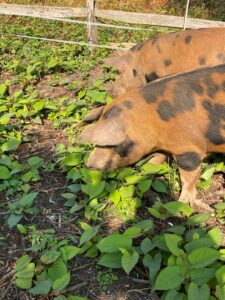Exotic or invasive plants are not native to the local ecosystem, and when introduced, can outcompete native plants for space and resources. Left unchecked by the natural enemies, pests, or predators that would exist in their native ecosystems, invasive species can flourish and ultimately cause aesthetic, ecological, and economic damage to the surrounding natural areas. Non-native invasive plants pose a risk to the rare and endangered species native to Nantucket. Therefore, the Land Bank works to prevent establishment and manages existing populations of these exotic invasives to help preserve the species unique to Nantucket.
For more information about invasive species on Nantucket, click here: Invasive Plant Species Committee Overview — Nantucket Biodiversity Initiative
Read below for a few examples of our invasive species management!
Japanese Knotweed
Japanese knotweed (Reynoutria japonica) is a common invasive species that is notoriously difficult to eradicate. It grows quickly and aggressively, easily outcompeting many native plants and eliminating wildlife habitat. Various methods of mechanical or chemical treatments take years of consistent follow-up to reduce the population. The Land Bank uses both mechanical and chemical techniques to reduce knotweed populations.

One factor that makes Japanese knotweed so difficult to remove is its extensive root system. These roots can grow several feet into the ground, making pulling or digging them out nearly impossible. In an effort to find a creative solution to control the knotweed invasion, the Land Bank called on one of our agricultural partners, Moors End Farm. Moors End is home to several pigs which are perfectly suited for Japanese knotweed removal by a method sometimes known as “pig scaping”. While eating, pigs are known to dig through the dirt to uproot any snack they find. As a pilot project (for two years in a row), we dispatched three pigs to one secluded patch of Japanese knotweed which they devoured after just a few weeks!
Phragmites
Phragmites Australis, the common reed, is an aggressive and ecologically damaging invasive species. Phragmites, which can grow up to 14 feet high, can quickly monopolize a given area by outcompeting surrounding vegetation and dominating wetland habitats. By removing Phragmites, we foster native biodiversity, allowing local wildlife and their habitats to thrive. Additionally, the removal of Phragmites improves the viewshed of many of our beloved water bodies on island!
The Land Bank has partnered with the Pond Coalition to treat Phragmites on Nantucket’s great ponds: Miacomet, Hummock, and Long Pond. Watch the video below for more information about this partnership.

